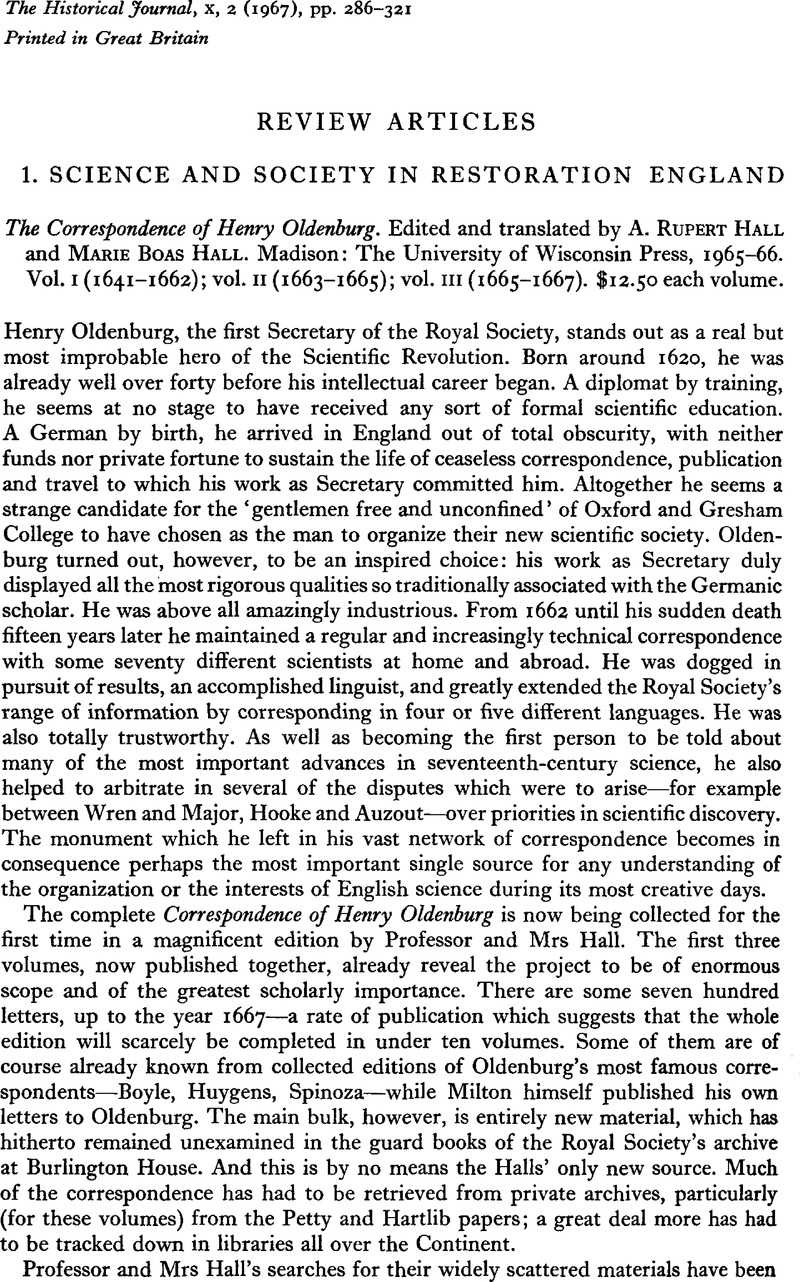Article contents
1. Science and Society in Restoration England
Published online by Cambridge University Press: 09 December 2010
Abstract

- Type
- Review Articles
- Information
- Copyright
- Copyright © Cambridge University Press 1967
References
1 Bracketed figures in the text refer to letters by their number in the Halls' edition.
2 The terminology is Professor Hall's own suggestion. See his important critique of the thesis , ‘Merton Revisited’, History of Science, II (1963), 1–16Google Scholar.
3 Merton, Robert K., ‘Science, Technology and Society in Seventeenth-Century England’, Osiris, iv (1938), 360–632.CrossRefGoogle Scholar
4 The thesis is sketched in The Century of Revolution (London, 1961)Google Scholar ; further insights in Society and Puritanism in Pre-Revolutionary England (London, 1964)Google Scholar ; full statement in Intellectual Origins of the English Revolution (Oxford, 1965)Google Scholar ; defended in ‘Puritanism, Capitalism and the Scientific Revolution’, Past and Present, xxix (1964), 88–97.Google Scholar
5 Oldenburg to Peter van Dam, Letter 257 of the Correspondence, 11, 14. (My stress.)
6 As Professor Hall has himself pointed out, developing craft skills neither imply nor necessarily lead to any important theoretical advances. See his essay ‘The Scholar and the Craftsman in the Scientific Revolution’ in Clagett, M., ed., Critical Problems in the History of Science (Madison, 1959), pp. 3–23Google Scholar.
7 Correspondence, Vol. 11, Introduction, p. xxi.
8 Correspondence, Vol. in, Introduction, p. xxv.
9 The assumption in Merton and in Hill, op. cit. See also Bredvold, L. I., ‘Dryden, Hobbes and the Royal Society’, Modern Philology, xxv (1928), 422.Google Scholar See too the biographies of Hobbes–e.g. Peters, R. S., Hobbes (Harmondsworth, 1956), pp. 41–2Google ScholarPubMed.
10 See my article, ‘Thomas Hobbes and his Disciples in France and England’, Comparative Studies in Society and History, vIII (1966), 153–67Google Scholar.
11 See Birch, Thomas, The History of the Royal Society, 4 vols. (London, 1756), I, 26–7.Google Scholar
12 Oldenburg to , Hobbes, Letter 32 of the Correspondence, 1, 75Google Scholar.
13 This point of course connects with an alternative type of explanation of the rise of seventeenth-century science, in which interpretation does proceed by ‘internal’ analysis of scientific developments themselves. This equally has its distinguished historiography. For pioneering work see Koyré, A.Études galiléennes (Paris, 1939).Google Scholar For emphasis on relevance of Aristotelian background, see esp. Crombie, A. C., Augustine to Galileo (London, 1952) andGoogle ScholarClagett, M., The Science of Mechanics in The Middle Ages (Madison, 1959)Google Scholar.
14 The suggestion is made in Kearney, H. F., ‘Puritanism, Capitalism and the Scientific Revolution’, Past and Present, XXVIII (1964), 81–101CrossRefGoogle Scholar.
- 1
- Cited by




